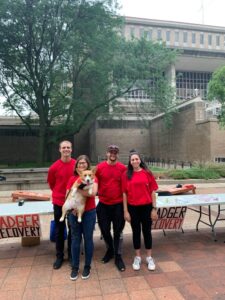Breese Terrace at 10 a.m. on a Badger football game day is pandemonium – music blares from nearby houses and balconies are crowded with students, red solo cups in hand. The scene may prompt feelings of excitement — or concern, particularly among students in recovery. Alcohol culture on campus can isolate and stigmatize students who are in recovery from substance use. In a setting where alcohol consumption is highly visible and often celebrated, it’s important for students to meaningfully counter the narrative around drinking and foster a welcoming campus for all. Finding fellowship both within the recovery community and in the greater campus community can not only help enrich a student’s college experience but also help them thrive. All students play a role in creating a campus culture of support, so students in recovery feel welcome at UW-Madison.

Badger Recovery at UW-Madison offers nonclinical, peer-led hybrid meetings twice a week, in which students can share as much (or as little) as they want, with the option to remain anonymous. There is no pressure to say anything during meetings; students are welcome to just come and listen to other students’ recovery experiences. Badger Recovery also hosts events, like sober tailgates before football games and study nights, so students in recovery can get to know each other. In addition, Badger Recovery can help students navigate conversations around sobriety and setting boundaries, as that can be intimidating. Here are some suggestions from Badger Recovery on how you can support those in recovery:
- Be aware of alcohol culture on campus. The availability of alcohol around campus and the surrounding community can lead many to believe that everyone drinks or you need to drink to fit in. In fact, the majority of students do not drink alcohol or drink in a low-risk way, (4 or less drinks in one sitting). Being mindful of alcohol culture on campus involves each of us examining our relationship with alcohol and how activities with alcohol could exclude non-drinkers and students in recovery. This includes holding study sessions in bars, normalizing blacking out, the ‘we want more beer’ cheer at football games, and social media showing binge drinking
- Use recovery-friendly language. This includes staying away from terms like ‘clean’ or ‘addict’ and instead using phrases like ‘substance-free’ or ‘person using substances.’ Person first language is always important – especially when talking about recovery.
- Discuss and respect the boundaries of those in recovery. Having discussions with your friends and those around you about their boundaries around alcohol can be very helpful in creating and sustaining healthy relationships. For instance, if you have a roommate who asks you not to have alcohol in common spaces, or a friend who asks you to leave an overwhelming party with them, respect those boundaries and offer to help out when you can.
- If you have friends in recovery, include them in your social circle and invite them to events. Recovery can be isolating, so maintaining friendships is important Just make sure that any outings align with your friend’s boundaries, and plan activities in areas where the setting or focus isn’t just on alcohol.
Finally, many people in recovery have found it important to have a support system that understands what they’re going through. Badger Recovery, UW-Madison’s collegiate recovery program, aims to provide that community for UW-Madison students.
“It is so much harder to go through recovery by yourself,” said Heather Rose, an undergraduate student and Badger Recovery assistant. “You’re not alone – there are other people struggling with the same thing.”
Learn more on the Badger Recovery website, Badger Recovery’s social media (@badgerrecovery), or reach out to recovery@uhs.wisc.edu.